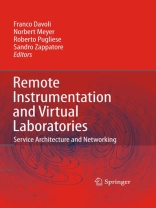Accessing remote instrumentation worldwide is one of the goals of e-Science. The task of enabling the execution of complex experiments that involve the use of distributed scientific instruments must be supported by a number of different architectural domains, which inter-work in a coordinated fashion to provide the necessary functionality. These domains embrace the physical instruments, the communication network interconnecting the distributed systems, the service oriented abstractions and their middleware. The Grid paradigm (or, more generally, the Service Oriented Architecture — SOA), viewed as a tool for the integration of distributed resources, plays a significant role, not only to manage computational aspects, but increasingly as an aggregator of measurement instrumentation and pervasive large-scale data acquisition platforms. In this context, the functionality of a SOA allows managing, maintaining and exploiting heterogeneous instrumentation and acquisition devices in a unified way, by providing standardized interfaces and common working environments to their users, but the peculiar aspects of dealing with real instruments of widely different categories may add new functional requirements to this scenario. On the other hand, the growing transport capacity of core and access networks allows data transfer at unprecedented speed, but new challenges arise from wireless access, wireless sensor networks, and the traversal of heterogeneous network domains.
The book focuses on all aspects related to the effective exploitation of remote instrumentation and to the building complex virtual laboratories on top of real devices and infrastructures. These include SOA and related middleware, high-speed networking in support of Grid applications, wireless Grids for acquisition devices and sensor networks, Quality of Service (Qo S) provisioning for real-time control, measurement instrumentation and methodology, as well as metrology issues in distributed systems.
สารบัญ
Remote Instrumentation Services.- Open Grid Forum Research Group: Remote Instrumentation Services in Grid Environment – Overview of Activities.- Adapting the Instrument Element to Support a Remote Instrumentation Infrastructure.- Performance Analysis of a Grid-Based Instrumentation Device Farm.- Experimental Characterization of Wireless and Wired Access in Distributed Laboratories.- Virtual Laboratory and Its Application in Genomics.- Grid Infrastructure, Services and Applications.- The European Grid Initiative (EGI).- Virtual Appliances: A Way to Provide Automatic Service Deployment.- Job Scheduling in Hierarchical Desktop Grids.- Towards Qo S Provision for Virtualized Resources in Grids.- From Grid Islands to a World Wide Grid.- The Anatomy of Grid Resource Management.- SZTAKI Desktop Grid: Adapting Clusters for Desktop Grids.- So RTGrid: A Grid Framework Compliant with Soft Real-Time Requirements.- A Data Grid Architecture for Real-Time Electron Microscopy Applications.- A Network-Aware Grid for Efficient Parallel Monte Carlo Simulation of Coagulation Phenomena.- Interactivity Management.- Practical Mechanisms for Managing Parallel and Interactive Jobs on Grid Environments.- Int.eu.grid.- Interactivity in Grid Computing in the Presence of Web Services.- Fusion Simulations, Data Visualization Results and Future Requirements for the Interactive Grid Infrastructure.- Interactive Grid-Access Using MATLAB.- Collaborative Interactivity in Parallel HPC Applications.- Interactive and Real-Time Applications on the EGEE Grid Infrastructure.- Supporting Services.- g-Eclipse – A Middleware-Independent Framework for Accessing Existing Grid Infrastructures.- Semantics-Based Context-Aware Dynamic Service Composition.- Distributed e-Science Application for Computational Speech Science.- Synchro Net.- Discovery of Resources in a Distributed Grid Environment Based on Specific Service Level Agreements (SLAs).- Inter-Domain SLA Enforcement in Qo S-Enabled Networks.- e VLBI and Cosmic Rays Detection.- High-Bandwidth Data Acquisition and Network Streaming in VLBI.- Real-Time Software Correlation.- Auger Access – Virtual Infrastructure for Simulating Complex Networks.- Metrology Issues.- Challenges and Design Issues in a Distributed Measurement Scenario.- The Distributed Measurement Systems: A New Challenge for the Metrologists.- Recent Progresses of the Remote Didactic Laboratory LA.DI.RE “G. Savastano” Project.- A Software Architecture for the m-Learning in Instrumentation and Measurement.- Sensor Networks for Measurement.- Performance of Linear Field Reconstruction Techniques with Noise and Correlated Field Spectrum.- Hybrid Zigbee–RFID Networks for Energy Saving and Lifetime Maximization.- A Service-Oriented Wireless Sensor Network for Power Metering.- Performance Evaluation of a Robust Data Aggregation Approach in Diverse Sensor Networking Environments.












